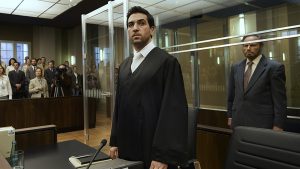(ThyBlackMan.com) The mark of a good crime/drama/thriller is that it keeps you guessing and guessing.
Caspar Leinen (Elyas M’Barek) just passed the bar three months ago. But there he is in a Berlin courtroom, the public defender for a 70-year-old Italian man named Fabrizio Collini (Franco Nero, John Wick Chapter 2 and The Lost City of Z). The defendant is accused of shooting and killing the prominent industrial CEO Hans Meyer (Manfred Zapatka). Collini doesn’t deny the charges in this high-profile case.
The judges look down their noses at the new lawyer as if he is in way over his head. Across the courtroom sits the famed attorney Richard Mattinger (Heiner Lauterbach), who happens to be one of Caspar’s old professors. Complicating matters, his client won’t reveal his motive, even though Caspar warns him that to mount a vigorous defense he needs “…motivation and emotion …” And, if there is any extenuating circumstance that propelled Collini to act, the judges must hear it.
The film is adapted from a bestselling German novel by Ferdinand von Schirach. The book sets the stage with the deceptive Meyers character, who is based on the author’s infamous grandfather, a leader of the Hitler Youth movement in WWII. Screenwriters Christian Zübert, Robert Gold and Jens-Frederik Otto up the ante and pile on the complications. 
Caspar has history with the murder victim. The defendant obviously had issues with Meyers, but won’t reveal their history. Meyer’s granddaughter Johanna (Alexandria Maria Lara), a former flame of the young lawyer, pressures him to drop the case. Her grandfather was Caspar’s mentor, and she tries to make him feel guilty. Johanna: “After everything grandfather did for you…” She also lays it on thick at Meyer’s funeral in a touching eulogy: “He could love without expecting anything in return.”
The one thing the film can’t do is make Collini’s predicament a life and death situation. In the U.S., depending on the state, he could face the death penalty. In Germany capital punishment doesn’t exist, so the danger for the defendant is never as dire as it could be.
Why is the tycoon dead? Who bashed his head in after he was shot? What’s the motive? Finding out the answers to those questions fuels Caspar’s investigation. His voyage of discovery pulls viewers along. Twists, betrayals, coverups, surprise witnesses, dark secrets, executions and retaliations are dispersed throughout. Once the film captures your attention, it doesn’t let go. Your casual interest turns into a real intrigue for a crime story that is unpredictable right up until the final credits.
Director Marco Kreuzpaintner’s (Trade and Sommerstrum) style is slick and professional. Scenes connect easily as the storyline weaves in and out. It’s very easy to follow plot points and keep track of facts that are too often revealed in flashbacks or thrown at the audience at the last minute. Kreuzpaintner’s filmmaking abilities are undeniable. If anything, his technique and the film in general lack a bit of gritty rawness and emotion. The kind that left Sidney Lumet crime/thrillers (Q&A, Before the Devil Knows You’re Dead) with indelible impressions.
Cinematographer Jakub Bejnarowicz makes the footage completely engaging. Extraordinary clarity, perfect lighting, visually attractive angles and saturated colors. He is as masterful with interiors as he is with exteriors, from Berlin to Tuscany. He is particularly agile with the courtroom scenes, which were shot simultaneously with up to three cameras. If anything, a little less of the sweeping and dramatic shots might have made the film feel more real. And, if editor Johannes Hubrich had cut some of the superfluous flashbacks, it would have helped viewers focus on the present and not the past.
Production designer Josef Sanktjohanser’s interpretation of how the courtroom, Meyer’s mansion and Italian villages should look is solid. Costume designer Gioia Raspé drapes Mattinger and the Meyer contingent in refined duds, while Caspar has a more accessible wardrobe. There are times when Ben Lukas Boysen’s musical score accentuates. Times when his soaring strings and angelic choirs are overly dramatic.
The ensemble cast holds the film together. Elyas M’Barek, who is of Austrian/Tunisian descent and looks it, stands out in a sea of white European faces. His very contemporary casting is brilliant and he gives the young attorney the proper amount of strength, ingenuity and vulnerability. It’s as if he’s the immigrant sleuth who makes Germany confront its past. Franco Nero’s performance is strong not for what he says, but for how he emotes without uttering a word. Though there is something very stagey and theatrical about Heiner Lauterbach’s interpretation of Mattinger, it’s a smugness that makes you wish the seasoned attorney would lose.
If you’re wondering why the man who plays Senior Public Prosecutor Reimers looks familiar, it’s because he’s Rainer Bock who co-starred in Wonder Woman and Netflix’s Better Call Saul. Alexandria Maria Lara assigns a cunning duplicitousness to the Johanna character. Pia Stutzenstein as a goth cohort who helps Caspar research his case adds a nice counterbalance to his very orderly demeanor.
Can’t deny it. There is a driving force in this crime/thriller that gets more intense as the film progresses. You may think you know where the storyline will go, then out of the blue, you’re thrown off course and left wondering why you didn’t see certain things coming.
Unyielding suspense, a noteworthy theme about justice and unjust laws, very professional production elements and a history lesson make The Collini Case thoughtfully absorbing cinema.
Written by Dwight Brown
Official website; http://DwightBrownInk.com

















Leave a Reply